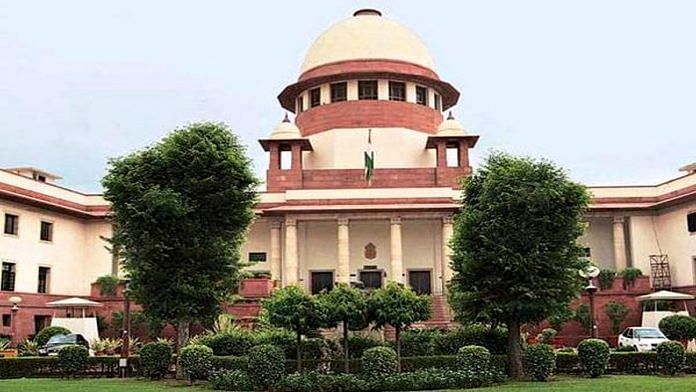New Delhi: The Supreme Court Thursday questioned the Narendra Modi government on the Rs 8 lakh per annum income ceiling fixed to determine the economically weaker section (EWS) for the purposes of reservation in higher educational institutions.
It asked the central government’s counsel how the EWS criteria of Rs 8 lakh per annum was fixed within two days of the 103rd Constitutional Amendment that introduced the reservation (in January 2019), and wondered whether any consultation process was undertaken before the same was notified.
The 103rd amendment allowed 27 per cent reservation for OBCs along with 10 per cent quota for those in the EWS category in higher educational institutions.
A two-judge bench led by Justice D.Y. Chandrachud also felt that the three-member panel set up by the government in November to reassess the eligibility criteria — while the SC was hearing a clutch of petitions challenging OBC and EWS reservation in the All-India Quota (AIQ) seats in state government medical institutions — was probably done to justify the already fixed criteria.
The panel, headed by former finance secretary Ajay Bhushan Pandey, has suggested sticking to the Rs 8 lakh per year limit for the determination of EWS.
Also read: Petitioners in SC question ‘completely arbitrary’ Rs 8 lakh income cap to determine EWS quota
‘Consultation in two days?’
“The 103rd amendment was notified on 14 January 2019 and on 17 January this notification (specifying the income-limit) came. So, in two days, the consultation with the Ministry of Social Justice took place?” the bench asked Solicitor General Tushar Mehta, as it reserved the verdict on petitions challenging the OBC and EWS quota in NEET PG admissions Thursday.
A late-night work list issued on the SC website shows the bench is likely to pronounce its verdict Friday morning.
On his part, Mehta denied the charges that there was no application of mind, and submitted that the panel had delved into various aspects before giving its interim report on 1 January.
Rebutting arguments of those opposing the reservation (of 10 per cent for the EWS category), Mehta said the quota would not affect their chances of securing seats as there is a move to increase the number of seats by about 20-25 per cent.
He said the reservation policy was part of the government’s inclusive growth programme and the increased seats will take care of the load on account of EWS quota.
Apart from voicing its concern over there being no survey or study before finalising the criterion, the court also questioned the logic behind fixing the limit at Rs 8 lakh. The judges indicated that the limit was on a higher side, considering the existing income tax limit is Rs 2.5 lakh.
The bench recalled that in its first affidavit, the government had said it followed the OBC creamy layer criterion. “But now your affidavit suggests that tax limit is an alternate criterion,” it said.
Therefore, the court added, it appears the committee “has attempted to justify the EWS criteria post facto”.
‘No single indicator can capture poverty’
In the bench’s assessment, if income alone was the criteria for EWS, then the criterion of Rs 8 lakh per year seems to be on the higher side.
Mehta explained that the word “income” in the panel’s report means “family income”. “We are considering family as a unit and not individual as a unit,” he said.
Further, he submitted that 90 per cent of the EWS category came under the Rs 2.5-5 lakh per year bracket, while 9-10 per cent fell in the Rs 8 lakh group.
However, he defended the criterion, arguing there cannot be a straitjacket formula to determine economic backwardness and “no single indicator can capture poverty”.
“We are not finding out who is poor. The word used is ‘economically weaker’. It doesn’t need to be Below Poverty Line (BPL), it can be slightly above the poverty line. We are not looking at the poor, but EWS. Even while framing the income tax limit, the government tends to be inclusive and even includes those who they deem to have savings,” he said.
‘Allowing creamy layer to come in’
Those opposing the reservation asserted before the court that no proper assessment was done to arrive at the figure of Rs 8 lakh annual income as the criterion for determining economic backwardness and asked the court to fix Rs 2.5 lakh as the limit for this year’s NEET-PG counselling.
They claimed with the Rs 8 lakh limit, the government was “allowing the creamy layer to come in”. The economically weaker section criteria of nutrition, landlessness, employment etc was completely ignored by the panel, they told the bench.
(Edited by Saikat Niyogi)
Also read: Will retain Rs 8 lakh income criteria for determining EWS quota, Modi govt tells SC



